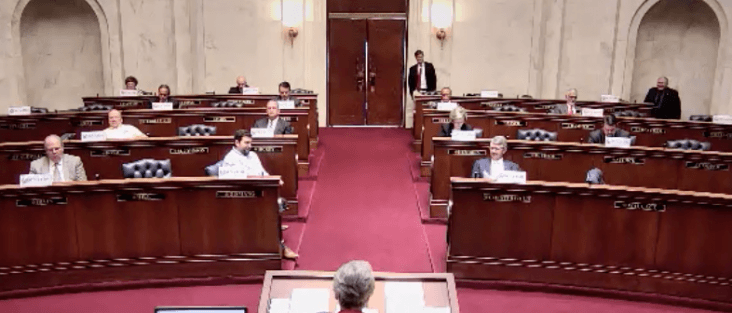Senate approves amendment proposal on special sessions; panel stalls two voting bills
by April 21, 2021 2:42 pm 712 views

A constitutional amendment that would allow the Arkansas Legislature to call itself into a special session passed Wednesday (April 21) in the Senate and now heads to the House for consideration. SJR 10 passed with a 30-2 vote, while three senators voted present.
Before it was passed, sponsor Sen. Breanne Davis, R-Russellville, said 36 other states have provisions to allow their legislatures to call themselves into special session. At least eight of those states only require a majority vote in each chamber.
SJR 10 would allow the legislature to come into a special session if two-thirds of the House and two-thirds of the Senate vote for it. The reasons for opening a special or extraordinary session must be specifically stated, she said.
The bill originally allowed for an extraordinary session to be called if the Speaker of the House and the Pro Tempore of the Senate decided to do so. The process of being called wouldn’t change per the bill; it would only add two other options for who can make the call.
“Only the governor can call us into a special session. … It mirrors how the governor calls us into a special session,” she added.
The latest impetus for this proposal comes from legislators who have been pushing for this expansion of power since last year when Gov. Asa Hutchinson issued a number of directives to deal with the COVID-19 pandemic. The Arkansas Constitution only allows the governor to call for a special session of the legislature and it requires him to provide a specific agenda, known as “a call” for the special session.
Gov. Hutchinson previously told Talk Business & Politics he doesn’t think the amendment is a good idea, saying it would set a dangerous precedent that would allow for the expansion of governmental power that is unneeded.
“Now, I hope that it does not go to the ballot for a vote on a referred constitutional amendment that would allow the legislature to call themselves into session. Historically, we’ve had a part-time legislature that meets once every two years in regular session. Well, this would convert it into really a full-time legislature,” the governor said.
VOTING BILLS STALL IN COMMITTEE
Two somewhat controversial bills relating to voting were shot down in the Senate Committee on State Agencies and Government earlier in the day. SB 701, sponsored by Clarke Tucker, D-Little Rock, would have placed the actual election date on the absentee ballots, simplified confusing language, and made other changes to streamline the absentee voting process.
If a ballot is suspected of being fraudulent, then all the materials relating to that ballot must be turned over to the local prosecutor or the State Board of Election Commissioners. Local election commissions would still retain the power to run and oversee all local elections, he added.
“I think absentee ballots are too complicated,” Tucker said.
Pulaski County Election Commission Chairperson Kristi Stahr opposed the bill. Changing the language on the ballot to language that “a typical voter would understand” is good in theory but too vague in practice, she said. A change like that could open elections up to lawsuits.
Another concern she had was the open date for counting absentee ballots. She thinks that any bill passed along these lines should have a close date for counting those ballots.
A bill that would have eliminated the last day of early voting also failed in committee. SB 485, sponsored by Kim Hammer, R-Benton, was proposed to help alleviate the burdens on election workers leading into a general election.
Election day is always on a Tuesday, and early voting typically stops on Monday. Stahr testified in defense of this bill, saying election workers don’t have enough time to prepare for the rigors of an election day when it is so close to the end of early voting.
Last year about 51,000 voters in the state cast a ballot on the last day of early voting. Hammer said the bill would help preserve the integrity of the ballots cast as well helping to ease the work done by election workers. He noted that in years past both Republicans and Democrats have supported removing the last day of early voting in some form.
Joshua Price, with the Pulaski Election Commission, disagreed with Hammer and Stahr. He said most election workers are excited to work the day before. Many voters are accustomed to voting in particular places on that day and disrupting that rhythm would be problematic, he added.
